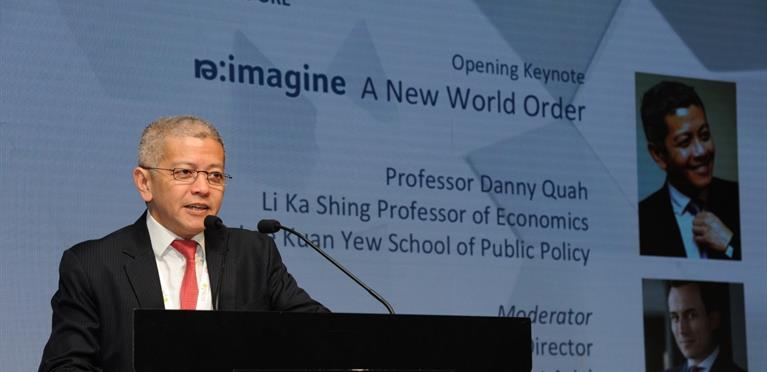Professor Danny Quah is currently Acting Dean, Li Ka Shing Professor in Economics, and Vice Dean (Academic Affairs) at the Lee Kuan Yew School of Public Policy (LKYSPP), NUS. (Update: Prof Quah is Dean from 1 May 2018)
Despite his busy schedule, he happily agreed to this interview.
Quotable Quotes
“I calculated the world’s shift in economic center of gravity and found it had moved 5000 km east in the last 35 years.”
“The beautiful, historical Bukit Timah campus, along with the Botanic Garden as the world’s top five gardens, makes every day here so pleasant.”
“My favourite book is ‘Snow Crash’ by Neal Stephenson, from a previous era of the cyberpunk genre.”
“I think I might have liked learning Taekwondo earlier and then having the opportunity to become a martial arts movie star like Bruce Lee!”

Q: What motivated you to come to Singapore after spending a long time in the US/UK?
A: I had three reasons for moving to Singapore.
Number one has to do with my research interests. I realize this might sound quite egocentric because it’s really about why Singapore is interesting to me, but also to everyone else. What I mean is, the things I worked on earlier in my research or writing used to be quite theoretical or analytical, and mostly based on problems in Western nations. This was not just because those data were most readily at hand. Rather it was because I, along with many others, believed that important economic (and social sciences) problems of the world had solutions to be found in Western advanced economies. In essence, this conviction was driven by the idea “What’s good for America is good for the world. What’s good forWestern advanced economies is good for the world.”
This view basically told us that if we could solve the problems in the West - business cycles, inflation, taxation, and income inequality - then we would know how to take on all challenges in yet other countries too. Perhaps far earlier in their own careers other scholars in Asia realized this view not to be useful. It took me a long time to fully grasp what it meant.
Instead, my interest in the problems of the emerging East came from trying to think through empirical evidence I saw in my research. When I was tracking global income distribution in the early 2000s, I noticed that since the 1990s that global distribution had started changing dramatically. At a conference in Buenos Aires, it was suggested to me that it was the rise of China and the rest of Asia that was responsible for this profound distortion.
Economists typically find it unsatisfactory that an explanation might have a proper name (like, say, “China” or “Asia”) rather than be anonymous forces or laws of motion (like, say, “the accumulation of capital”).
So I sought a hybrid line of attack. To quantify the ‘rise of China/Asia’, I calculated the world’s shift in economic center of gravity – making something literal that previously had been just metaphor. I found thatcentre had moved 5000 km east in the last 35 years. Thus, I suppose my first motivation for coming to Singapore is the rise of the East. This is now a critical part of my research. It concerns how scholars should rethink their understanding of the global economy.
The second reason is that previously what you might consider my principal Key Performance Indicators, my KPIs, all revolved around my being a member of a very precise academic discipline. In Economics, among those KPIs might be the number of economics students (PhD in particular) that I trained, or more generally the number of economists that I was responsible for sending out into the world. Gradually, however, I felt that I could contribute more by talking to people who wished to use economic principles, rather than just those aspiring to be yet more academic economists. I reckoned I might be more socially useful being in an environment where the demand for economic understanding is high, because genuine problems needed to be solved, not because the individual that one is speaking to wanted to be another economist. Schools of public policy like LKYSPP thus became natural venues where I figured I might be useful. Combining this with our earlier discussion, I believe the need for applied economic thinking is urgent in Asia because most of this region is still developing, so being here would allow me to experience higher marginal productivity and potentially to generate greater impact.
The third reason is somewhat personal, I guess. There is something about coming ‘home’, whether it is the culture, food, linguistics, family, and social connections. To me, it is not just about “Oh, let’s go see what Asia is like now”, but also to see how the norms and conventions in this place have been transformed due to growth and development process. I’m curious, and I want to be a fly on the wall.
Q: From my understanding so far, you were saying that if you were at an institution in the US/UK, the atmosphere would be really Western-centric, wouldn’t it?
A: Yes, that’s a very good point. Indeed, many Westerners have in mind what they consider to be a universalist model, meaning they reckon their theories and the ideas to put into practice are universally applicable. I might have thought that too previously, but I no longer think so! The East remains pluralistic and pragmatic in its approach to the problems it solves. Some ask me, how can you talk about “the East”, when everything out here is so varied and heterogeneous and different? In my view, this heterogeneity is exactly why the East carries the promise that it does.
A few years before I actually moved to Singapore, someone here in the East called me and said, “Why do you do this in London, write about the rise of Asia? Why don’t you come to Asia, and tell our story from here?” When LKYSPP Founding Dean Kishore Mahbubani eventually asked me the same question, I thought if the man who wrote “Can Asians Think?” wants me to help tell Asia’s story too, perhaps I really can be helpful here.
So, that’s how I came to Singapore.
Q: How would you describe your time here at LKYSPP as Li Ka Shing Professor in Economics, then Vice Dean, and then Acting Dean?
A: It’s been delightful. There have certainly been changes in the living surroundings, teaching/learning styles, and general tone of conversation. But that happens whenever anyone moves 8 timezones from the US/UK to Singapore. I appreciate and value how students here are eager to solve real problems and do not necessarily want to become specialists.
I enjoy the new interdisciplinary approach instead of my traditional, centralized one in Economics. In addition, the beautiful, historical Bukit Timah campus, along with the Botanic Garden as the world’s top five gardens, makes every day here so much pleasant.
Q: In what ways do you think LKYSPP could develop its degree programs to help students succeed in Asia?
A: I think there are two ways to achieve this. The first is to build up students’ knowledge via technical tools – whether in economic foundations, political science and international relations, or leadership and management. The second is to focus on how we can improve the lives of people in Asia, to help transform Asia. Good governance is a key part of the DNA of the LKY School; it infuses a lot of how we need to get people to think about the challenges their societies face. So, we need to apply those tools in the right context with the region’s specific characteristics.I find the LKYSPP has done a remarkable job historically in connecting these two approaches. But obviously much more is needed still.
Q: Do you have any ideas for new modules in the future?
A: I think the LKY School Course is already an innovation since we’ve never had this before. What that module tried to produce is a broad range of insights into specific problems related to Singapore’s development, including race, religion, water, health, and superpower competition. Basically, it takes a variety of ideas and approaches on what seem at first special problems that then turn out to be generalizable. And it gives all our students a shared experience, one that I hope they will remember as vividly as many do College Green.
I’d like to see a module which will be taught by a diverse group of people and dig a bit deeper into different specific questions/domains. So, a multi-disciplinary course evolving from lectures to small seminars organized around big ideas and panel discussions is expected to assist students in exploring their own policy interests.

Q: Now is the time for something outside academics and more fun. Please name your favorite book and explain why.
A: Well, the book I want to name is quite old. It’s ‘Snow Crash’ by Neal Stephenson from a previous era of the cyberpunk genre. This fiction is very creative and forward-looking because it envisions a circumstance where people could have life online - the Internet environment. And that is exactly Artificial Intelligence (AI) and Virtual Reality (VR) now suggest is possible.
Cyberpunk was popular in the 1990s, so ‘Snow Crash’ is an example of this literature and an illustration of how economic activities will have to migrate onto the Internet. And today we have online shops, immersive experiences, Tinder dating, and so on – Facebook, Apple,Amazon, Google. That cyberpunk vision was, however, conceived in an age with much more limited technology. Yet people like Neal Stephenson, William Gibson, Bruce Sterling, powerfully imagined what life would become putting into the narrative inventions that did not yet exist, but following principles – economic ones and others – that have stood the test of time.
Q: If not working in academia now, what would you be doing?
A: Oh, I took up martial arts (Taekwondo) quite late in my life, so sometimes I think it could have been nice if I had learnt Taekwondo earlier and then had the opportunity to become a martial arts movie star like Bruce Lee!
Q: Last but not least, any words of wisdom to LKYSPP students and alumni?
A: Keep learning and keep experimenting in life.
Interviewee’s Bio: Before joining LKYSPP in July 2016, Professor Quah held teaching positions as Assistant Professor of Economics at MIT, and then Professor of Economics and International Development at LSE. He was also Founding Director of the Saw Swee Hock Southeast Asia Centre at LSE. He previously served as LSE’s Head of Department for Economics, and Council Member on Malaysia’s National Economic Advisory Council. For his detailed profile, please visit: https://lkyspp.nus.edu.sg/our-people/our-faculty/danny-quah/